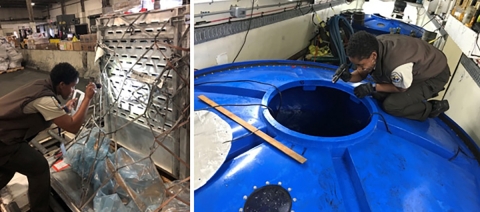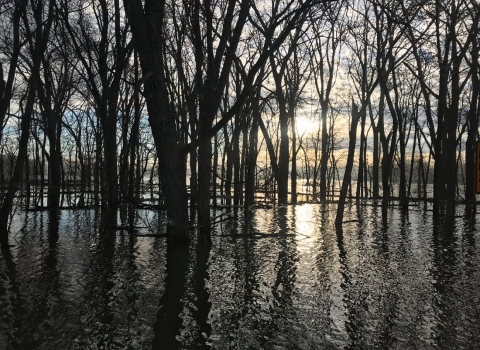“As for women who are interested in wildlife law enforcement careers, I would encourage them to be confident and fearless. They must know that within themselves they are capable of anything they set their mind to,” Wildlife Inspector Camille Sims.
What is your primary work focus?
As a wildlife inspector, I facilitate the legal wildlife trade and combat international wildlife trafficking.
Why do you believe your job makes a positive difference?
Biodiversity has a major impact on the overall health of our planet and my job is important because wildlife inspectors diligently control the legal trade and fight wildlife trafficking that could have dangerous impacts on the planet’s biodiversity. I also do not want commercial entities to take advantage of wildlife and overexploit them for financial gain because greed will never override the integrity of our natural resources on my watch. I also feel like my job is important in making sure there are checks and balances in our monitoring system; that way it will help other scientists to make decisions if something is becoming endangered due to overconsumption.
What was your career path that brought you to the Service?
In 2011, I started my career in the Service as an intern in the Career Discovery Internship Program and later merged into the Pathways Program. My background includes working as a biological technician at many refuges on the east coast; supporting the sea turtle program at Back Bay National Wildlife Refuge; and monitoring bats and piping plovers, invasive management, forest inventory, and salt marsh salt marsh
Salt marshes are found in tidal areas near the coast, where freshwater mixes with saltwater.
Learn more about salt marsh maintenance at Long Island NWR Complex. Refuges always has a special place in my heart, but I later made the transition to being a wildlife inspector.
How did you first become interested in wildlife/conservation/the outdoors?
Growing up, my mother always took my brother and me to the library. I would check out countless books on all things animal related. She even enrolled us in these after-school programs at the library, and there was an event that had a show-and-tell with a reptile theme. That was my first time seeing and holding large exotics such a yellow boa constrictor and a soft-shelled turtle. I was in awe! I loved learning about wildlife and what I could do to help them thrive.
I grew up in the suburbs of Virginia. Now it is highly commercialized and city-like, but during my childhood and right behind my family home, was a forested meadow. I loved to explore and play in it, during which I saw majestic deer, sly foxes, grumpy groundhogs, and busy birds taking care of their young. It was truly a magical and safe haven for me and it made me very sad and angry when it was developed. Looking back, it is a childhood story I hold dear to myself because, really, that is where my flame for wildlife conservation was ignited!
What are you most proud of?
I am proud of my ability to persevere in adverse circumstances. My parents taught me that you do not have to be the smartest, fastest, or the wisest, but if you put in the hard work you can accomplish anything you put your mind to!
It is important to be honest with yourself about your shortcomings and limitations because if you are too prideful to ask for help, or to even be willing to learn from others, you will never excel or grow.
I love being part of a team, and I love learning new things from everyone.
What advice would you give to a young woman who is thinking about pursuing a career in wildlife law enforcement?
Workplaces are making efforts to be more diverse and inclusive. This is always a positive change. As for women who are interested in wildlife law enforcement careers, I would encourage them to be confident and fearless. They must know that within themselves they are capable of anything they set their mind to. Be patient with yourself. You’re not going to learn everything in the first few years on the job, and you are not going to solve a wildlife smuggling ring on your first day! Enjoy the highs and lows of learning as much as you can. Always wake up with “I can do attitude” and show up on time; someone who is reliable in the work place is truly valuable to any team. Never be afraid of the gross and scary inspections, that is where you find the good stuff!
You mentioned not shying away from gross/scary inspections; that's where you find the good stuff. Can you share an example of an inspection like this?
I like to think wildlife criminals hide things in odd places where you would not look because you may be too scared or uncomfortable to - I try not to let that stop me from doing a full and thorough inspection.
Intense inspections with charismatic species always get my adrenaline pumping; it keeps me on my toes. I've accomplished many live inspections at my time working in Valley Stream. My favorite inspections were of tiger sharks and a Siberian tiger. The sharks were going to an aquarium, and the tiger was going to the zoo. Making sure these animals are transported humanely and ethically is very important to me. I always make sure the customer is doing their part to ensure a safe and comfortable transport of the animals.
How does the danger of your job affect your loved ones?
My family isn’t really worried about me while I do my job. They trust me and they trust that I will use my on-the-job training effectively. Safety is obviously important, so I take it very seriously when inspecting. I want to help everyone in any way I can, but I also want to go home to my family at the end of the day.
What challenges did you overcome to get where you are today?
Myself. I am my own worst enemy. I used to struggle a lot with my self-confidence. I have had a lot of help and mentoring to get past this roadblock. If I ever start to self-doubt, I like to meditate on things that I have already accomplished. If I got over one hurdle, I know I can get over the next!
- Interviewed and written by Wildlife Inspector Colleen Scully, OLE Comms Team




